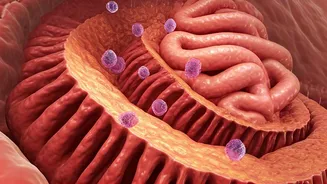Protein Absorption Explained
The human body's capacity to absorb protein is a topic of much discussion. Contrary to popular belief, the body doesn't have a strict upper limit on the amount
of protein it can absorb in a single sitting. However, the rate at which protein is absorbed and utilized varies. Several factors influence this, including the individual's size, metabolism, activity level, and the specific type of protein consumed. Research indicates that the body can continuously absorb and utilize protein throughout the day. It's more about spreading protein intake to meet the body's needs rather than adhering to a rigid absorption limit. This understanding moves away from the old idea of needing to measure out exactly how much protein you're taking in all the time. Instead, it places emphasis on balanced protein distribution throughout the day.
Factors Affecting Absorption
Several elements play a vital role in determining how efficiently the body processes protein. One significant aspect is the type of protein. Whey protein, for example, is rapidly digested, making it an excellent choice post-workout. Casein protein, on the other hand, digests more slowly, offering a sustained release of amino acids. The individual's metabolic rate and the intensity of their physical activity are also crucial. Someone who engages in intense exercise may require more protein and have a higher absorption rate than someone with a sedentary lifestyle. Gut health is also an important factor; the digestive system must function correctly to break down and absorb protein effectively. Issues like poor gut health can hamper protein absorption, impacting muscle growth and recovery. Proper hydration also helps digestion and nutrient absorption. Drinking sufficient water will help your body make the most of the protein you consume.
Optimal Protein Intake Strategies
Instead of focusing on a fixed limit, it's more beneficial to think about how to optimize your protein intake. The goal should be to spread protein consumption throughout the day to support muscle repair, growth, and overall health. Aim for a consistent intake of protein at each meal, rather than consuming the bulk of your protein in a single sitting. Consuming protein-rich foods or supplements soon after workouts is recommended, because it can help with muscle recovery and promote growth. Additionally, the overall daily protein intake is essential. Based on various factors like activity level, most adults should consume 0.8 grams of protein per kilogram of body weight. Athletes and those seeking muscle gain may need more. Consulting with a healthcare professional or a registered dietitian is always wise. They can provide personalized advice based on individual needs and goals, ensuring that protein intake aligns with specific health objectives.
Myths and Misconceptions
One of the most persistent myths is the '30-gram limit,' which suggests the body can only absorb a specific amount of protein in one go. While the body's ability to absorb is real, this number is an oversimplification. The body does not waste or eliminate protein when the intake is high; instead, it uses the extra amino acids for other bodily functions. Another misconception is that more protein always equals more muscle. Excessive protein intake won't necessarily lead to enhanced muscle development, and if the body doesn't need it, it will eventually convert the protein into glucose or store it as fat. It's also a myth that plant-based proteins are inferior to animal-based proteins. Both sources can provide adequate protein if a variety of sources are included in the diet. Understanding these misconceptions is key to developing a well-balanced approach to protein intake, based on actual biological mechanisms.
Practical Dietary Tips
To optimize your protein intake, integrate a variety of protein sources into your meals. Include both animal and plant-based protein sources, such as lean meats, poultry, fish, eggs, dairy products, legumes, nuts, and seeds. Plan your meals to include a protein-rich option at each one. For example, breakfast can include eggs or Greek yogurt, lunch can have chicken or a bean salad, and dinner can involve fish or lentils. Consider using protein supplements like whey or casein after workouts or as a convenient snack. It's also important to time your protein intake around your workout schedule. For exercise, aiming to get protein within an hour post-workout is optimal. Furthermore, pay attention to the overall balance of your diet. Protein should be accompanied by carbohydrates and healthy fats to support your body's energy needs and overall health. Making these practical changes will assist in effective protein management.












